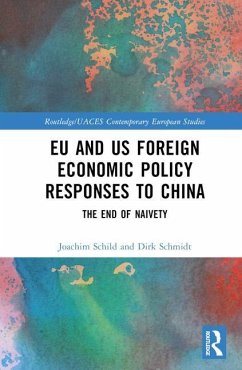This book examines EU and US bilateral trade and investment relations with China, their attempts to level the economic playing field and to narrow the 'reciprocity gap' in market openness.
It explores the extent of EU and US policy change, the underlying factors accounting for this change and compares EU and US foreign economic policy answers to an adversary increasingly perceived as an unfair economic competitor and as a systemic rival. The book covers a broad range of policy areas from 'trade wars', trade defense instruments, their reform and use, investment screening, and export control to industrial policies. It makes eclectic use of different strands of International Relations, International Political Economy and Policy Analysis theorizing to account for the extent of, and differences in, the EU and US responses.
The People's Republic of China's stellar economic and political rise combined with the resilience of its unfair trade practices, its reinforced authoritarian repression at home and its ever more assertive foreign (economic) policy has triggered a shift in perceptions of China, followed by equally profound policy change in the European Union and the US. This book expertly charts and explains this significant shift in stance.
This book will be of key interest to scholars, students and practitioners in the fields of EU trade policymaking, US foreign/ foreign economic policy, EU-China-US economic relations, European political economy, and more broadly to European studies, Asian studies, International Relations, International Political Economy, and transatlantic relations.
It explores the extent of EU and US policy change, the underlying factors accounting for this change and compares EU and US foreign economic policy answers to an adversary increasingly perceived as an unfair economic competitor and as a systemic rival. The book covers a broad range of policy areas from 'trade wars', trade defense instruments, their reform and use, investment screening, and export control to industrial policies. It makes eclectic use of different strands of International Relations, International Political Economy and Policy Analysis theorizing to account for the extent of, and differences in, the EU and US responses.
The People's Republic of China's stellar economic and political rise combined with the resilience of its unfair trade practices, its reinforced authoritarian repression at home and its ever more assertive foreign (economic) policy has triggered a shift in perceptions of China, followed by equally profound policy change in the European Union and the US. This book expertly charts and explains this significant shift in stance.
This book will be of key interest to scholars, students and practitioners in the fields of EU trade policymaking, US foreign/ foreign economic policy, EU-China-US economic relations, European political economy, and more broadly to European studies, Asian studies, International Relations, International Political Economy, and transatlantic relations.

